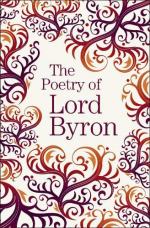|
This section contains 334 words (approx. 1 page at 400 words per page) |

|
Darkness (Poem) Summary & Study Guide Description
Darkness (Poem) Summary & Study Guide includes comprehensive information and analysis to help you understand the book. This study guide contains the following sections:
This detailed literature summary also contains Quotes and a Free Quiz on Darkness (Poem) by Lord Byron.
The following version of the poem was used to create this guide: Lord Byron. "Darkness." Poetry Foundation. https://www.poetryfoundation.org/poems/43825/darkness-56d222aeeee1b
Note that all parenthetical citations within the guide refer to the lines of the poem from which the quotations are taken.
George Gordon, Lord Byron, is one of the more interesting figures in literary history. He was the son of the indebted Captain John Byron and his second wife Catherine of Gight, who had to sell her title to settle her husband's debts and later died by suicide. Byron was born in 1788, with a deformed foot that limited his mobility. He was educated at Cambridge, where he was known for his academic brilliance, his fiery temper, and his extremely intimate friendships with other men (many of which are now believed to have been romantic and/or sexual in nature). Relatively soon after he started writing, he became quite famous.
As a young man, he spent a lot of time traveling in the East. He had a variety of sexual escapades during this time, including with adolescents of both sexes and several men. Byron then returned to England, where he married Annabella Milbanke and had a daughter (the future computing innovator, Ada Lovelace). Rumors that Byron was engaged in an affair with his half-sister contributed to the failure of his marriage, and he fled to Switzerland. There, he became good friends with other writers, including the Shelleys. He then traveled to Italy, where he became enamored of Armenian culture and took a 22-year-old countess as his mistress. Eventually, when her father persuaded her to leave Byron, he went to Ottoman Greece to fight in their war of independence, where he was killed.
"Darkness" is a poem that depicts the end of the world. It is perhaps one of Byron's bleakest and most desperate poetic portraits, and stands out in the history of English literature as a truly horrifying representation of what the apocalypse could bring.
Read more from the Study Guide
|
This section contains 334 words (approx. 1 page at 400 words per page) |

|



